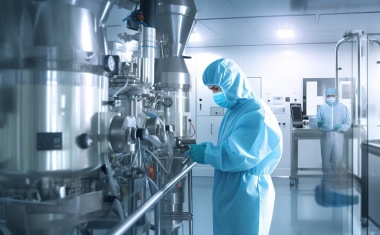
Elixir Group Continues Sustainable Growth Strategy
The Serbian Elixir Group continues to focus clearly on expansion and sustainability.

The Serbian Elixir Group continues to focus clearly on expansion and sustainability.

By enhancing offerings, ensuring performance, managing costs, and embracing sustainability, distributors prove as essential partners for long-term success amidst evolving challenges.

In the rapidly evolving industry of contract development and manufacturing organizations (CDMOs), a well-defined pricing strategy is essential to drive growth and profitability. To stay ahead and participate in the expansion of the market, CDMOs need to transition to a structured value-based pricing approach that considers customer value, complexity, and specific needs.

With more than 80% of all chemical products manufactured using catalytic processes, catalysts are the number one value generator in the chemical industry.

The concept of a circular economy, where materials are recycled and reused, is becoming increasingly important in consumer packaging, driven by regulatory requirements and customer interest. Modern technical advancements make it easier to think of today's goods and products as the resources of tomorrow. One such product is plastic.

When developing an inhaled powder formulation, the drug particles’ properties are critical to successful delivery to the deep lung. The aerodynamic diameter is the key parameter, as it represents how well the particle flies in an air stream.

When manufacturing specialty edible fats, ensuring that the product has the desired properties – such as a stable shelf life, optimal melting behavior, and texture – is essential.

Many life science companies generate large swathes of data.

The demand for medicines is increasing rapidly and R&D pipelines have doubled over the last decade.

With their triumphant advance, biosimilars are also setting in motion the usual market mechanisms. Biopharma interest groups warn against the automatic substitution of originator drugs.

The pharmaceutical market is undergoing a profound transformation, driven by innovation among biologics and advanced therapies (ATs). This shift is not only redefining the treatment landscape but also presenting new opportunities and challenges related to the drug development and manufacturing value chain.

Contract development and manufacturing organizations (CDMOs) are a crucial part of the life sciences industry. Strangely, despite its current prominence, the CDMO industry is a relatively young one. There have been significant developments over its short lifespan, and it is likely that we see even more growth in the years to come.

In its latest European Chemicals Pulse Check, Deloitte surveyed senior executives in the European chemical industry and industry associations about their views on current market challenges, trends and opportunities.

China’s chemical industry originally focused primarily on basic chemicals, in line with the domestic needs of a developing economy and the lower technology requirements for the production of these materials. By now, China dominates the global market for many such chemicals – for example, the country accounts for about 55% of the global capacity for acetic acid, about 50% of the global carbon black capacity and about 45% of the global capacity for titanium dioxide. For many such commodity chemicals, China started out as a net importer, then built up domestic capacity and ended up being a major exporter.

Achieving sustainability targets and productivity improvements are primary levers that make operations teams successful. At MBCC Group, one of the leading construction chemicals players, Wayne Towell, Vice President of Operations has been driving various initiatives to track, monitor and enhance productivity of their plants across the globe.

As a global specialty chemicals company, Altana develops innovative technologies, solutions, and products with a clear customer focus. The company aims to strengthen and expand this position in the long term. The topic of digital transformation plays a key role.

As a global specialty chemicals company, Altana develops innovative technologies, solutions, and products with a clear customer focus. The company aims to strengthen and expand this position in the long term. The topic of digital transformation plays a key role.

For Siegfried, sustainability is much more than a phrase with a green coating. The term, which encompasses social and economic criteria in addition to ecological aspects, is one of five central corporate values. One of the biggest levers for reducing energy and resource consumption in the pharma supply chain lies in the efficient production of active ingredients and pharmaceuticals. The company therefore works consistently on optimizing its processes.

After acquiring the two Catalonian sites in Barberà del Vallès and El Masnou about two years ago, Siegfried is now significantly expanding its expertise in the production of complex Drug Products containing Highly-Potent APIs (HPAPIs). In addition, the company has opened a new development center for oral solid dosage forms with active ingredients and HPAPIs as well as for ophthalmic sterile products. This not only strengthens Siegfried's position in the area of drug products, but also its global network and international competitiveness.

The market for APIs is expanding significantly. Experts predict annual growth rates between 4.5 and 7.6 percent by 2029. There are plenty of good reasons for this: Chronic diseases are on the rise - and with them the need for medicines and active ingredients. In addition, the economic upswing in several emerging countries means that more people can afford novel medicines. APIs are also benefiting from the trend toward personalized medicine and the growing understanding of diseases. Meanwhile, API developers and manufacturers are working on increasingly sophisticated methods to better handle these delicate substances.

The Pharmaceutical industry must prioritize sustainability. Jürgen Roos, Chief Scientific Officer (CSO) of Siegfried, explains opportunities and limits of sustainability.

Climate change, energy crisis, the call for a more environmentally compatible production method and socially responsible action do not stop at the pharmaceutical and biotech industries. Sustainability is becoming a central competitive and reputation factor and carries a high economic value. This need not be to the industry´s disadvantage. It helps companies to make processes more efficient, reduces energy consumption and keeps costs in check. But is the pharmaceutical industry already doing enough in this regard?

The Fill & Finish of biologic drugs is expensive and poses special technological challenges for CDMOs. At the German site in Hameln, Siegfried has successfully proven these capabilities over the past two years by producing Covid-19 vaccines and a significant number of clinical batches for several biological companies. By investing in its competencies, capacities and flexibility, the company intends to further expand this demanding but promising business area.

The CDMO (contract development and manufacturing organizations) business has a bright future, of that Siegfried CEO Wolfgang Wienand is certain. The economic advantages alone speak for this compared to in-house production by the pharmaceutical companies themselves. Although Siegfried has already reached sufficient critical size within its industry, he sees the company continuing on its growth path. The goal is to take over an even larger share of the value chain from pharmaceutical companies in the future.

Sustainable manufacturing is one of the most common demands industries, such as the pharmaceutical, chemical, and biotechnological industries, are faced with today.

Interview with Klara Yoon, Tina Rose and Stephan Enthaler, New Dawn

Interview with Fajer Mushtaq and Silvan Staufert, Oxyle

Actylis, leading global manufacturer and sourcing expert of critical raw materials and performance ingredients for the life sciences and specialty chemicals markets, made its debut in September 2022. The new CDMO was created from US-based fine and specialty chemicals distributor Aceto. Gilles Cottier, CEO of Actylis, has played a tremendous role in Aceto’s transformation into the new Actylis brand. Ralf Kempf and Michael Reubold asked Cottier about the reasons for creating the new brand identity, the challenges of combining so many companies, and Actylis' strategy going forward.

Interview with Sylke Hassel, previous CEO of PharmaZell and current CEO of Axplora following the merger with Novasep.

Executives and industry experts share their views on drivers as well as barriers for the use of flow chemistry in pharmaceutical manufacturing and the prospect for this technology in their industry sector.

The 2023 edition of PARTEC, the International Congress on Particle Technology, will take place on September 26−28, 2023 in Nuremberg, Germany. As one of the world's major scientific congresses for particle and bulk solids technology, it provides an international forum for R&D in new technologies.

Artificial intelligence (AI) has become one of the supporting pillars for digitalization in many areas of the business world. The pharmaceutical industry and its GxP-regulated areas also want to use AI in a beneficial way, but only a small fraction of companies follows a systematic approach for the digitalization of their operations and validation. However, the assurance of integrity and quality of outputs via computerized system validation is essential for applications in GxP environments.

The chemicals industry is one of the world’s largest industrial sectors, worth €3,471 billion in 2020. It includes producers of industrial chemicals, polymers, pesticides, food and feed additives, and cosmetics, and is growing rapidly. By some estimates it will reach almost $22,000 billion by 2060.

Traditional batch chemistry is too inefficient for a sustainable future. Switching batch processing to continuous processing is inevitable if the world is to reach net zero.

For decades, Ferrate(VI) has been known as the strongest oxidant in the world for the treatment of (industrial) wastewater.